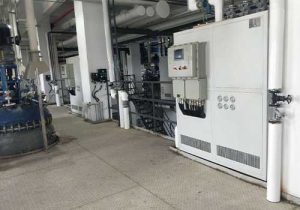industrial water cooled chillers
Industrial Water-Cooled Chillers: Precision Temperature Control for Industry
Industrial water-cooled chillers are essential in maintaining optimal temperatures within various industrial processes. These chillers use water as a cooling medium, providing a reliable and efficient means of heat transfer. They are particularly useful in applications where precise temperature control is critical, such as in chemical reactions, product cooling, and machinery operation.

Technology and Innovation in Water-Cooled Chillers
The technology behind water-cooled chillers has seen significant innovation in recent years. Manufacturers are developing chillers that use low Global Warming Potential (GWP) refrigerants, such as Hydrofluoro-olefins (HFOs) or natural refrigerants like carbon dioxide (CO2). These advancements not only improve the efficiency of the chillers but also reduce their environmental impact.
Chiller systems are becoming more intelligent, with features such as energy efficiency, expandability, compact design, low environmental impact, and wireless technology being crucial for market success. The use of advanced controllers, like the Elektronikon® MkV Touch controller, provides users with easy control and monitoring capabilities, enhancing the overall performance and reliability of the chiller system.
Applications of Industrial Water-Cooled Chillers
Industrial water-cooled chillers find extensive applications across various industries. Some of the key applications include:
Chemical Plants: In chemical manufacturing, chillers are used to control the temperature of reactions, ensuring the quality and safety of the products.

Manufacturing Facilities: Chillers are essential in maintaining the optimal operating temperature for machinery and processes, contributing to process efficiency and product quality.
Medical Facilities: In laboratories and cleanrooms, chillers help maintain the precise temperature conditions required for sensitive medical and pharmaceutical processes.
Food and Beverage Industry: Chillers are used for cooling processes, such as fermentation and pasteurization, as well as for cooling beverages and perishable goods.
Market Trends and Growth
The market for water-cooled chillers is characterized by a high degree of product innovation and a focus on energy efficiency. Water-cooled chillers held the largest revenue share in the chiller market in 2023, due to their compact size, high energy efficiency, and long life. The demand for air-cooled chillers is also expected to surge worldwide, driven by smooth operations at extremely low temperatures and increasing water scarcity.
Efficiency and Maintenance

Industrial water-cooled chillers are designed for high efficiency and ease of maintenance. Features such as stainless steel components, all-aluminum microchannel condensers, and fully hermetic scroll compressors contribute to their reliability and longevity. Regular maintenance, including cleaning and inspection of the heat exchangers and checking for refrigerant leaks, is essential for ensuring the chiller’s optimal performance and safety.
Conclusion
Industrial water-cooled chillers are vital components in many industrial processes, providing precise temperature control and ensuring the efficiency and quality of operations. With ongoing innovations in refrigeration technology and a focus on energy efficiency and environmental sustainability, these chillers are set to play a crucial role in the future of industrial cooling. As the market continues to evolve, the demand for industrial water-cooled chillers is expected to grow, driven by the need for more intelligent and efficient cooling solutions.
Related recommendations
chiller unit price
308Chillers are essential pieces of equipment in numerous industries and applications, tasked with removing heat from a process or space. The price of a chiller unit is a key consideration for buyers...
View detailsHow to Reduce the Operating Cost of Air-cooled Chillers?
1234How to Reduce the Operating Cost of Air-cooled Chillers? In life, we are all advocating energy saving and environmental protection, and air-cooled chillers are no exception. The chillers pur...
View detailstemporary chiller
358Temporary Chillers: An In - Depth Look Introduction Temporary chillers serve as a practical solution for short - term cooling requirements. In many cases, they act as a stop - gap measure ...
View detailswater chiller cooler
193Working PrinciplesThe operation of a water chiller cooler is based on the refrigeration cycle, which involves four main stages working together to remove heat: Compression: The compressor...
View details
 LNEYA Chiller
LNEYA Chiller







HelloPlease log in